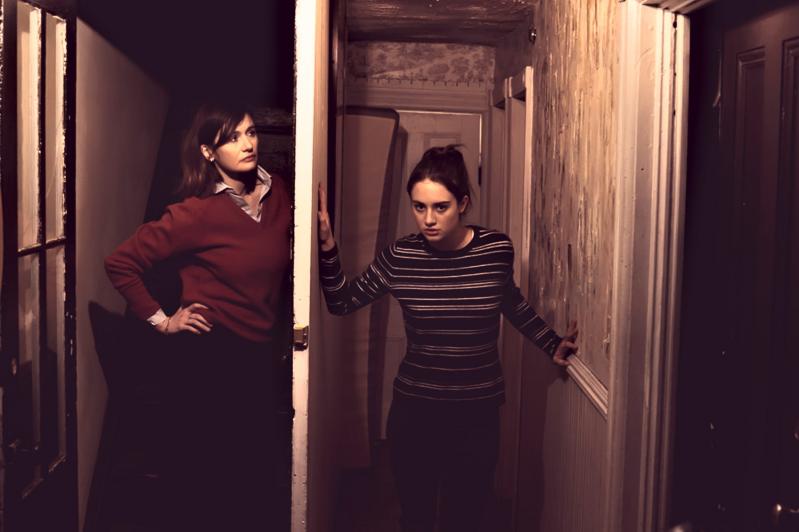Although no domestic release date has been set, “Good Posture,” a film by Dolly Wells starring her friend Emily Mortimer of Amagansett, will open in the United Kingdom on Friday, Oct. 4.
It premiered in the spring at the Tribeca Film Festival, during which Ms. Mortimer and her co-star, Grace Van Patten, sat down with Ms. Wells at the Roxy Hotel in Tribeca to discuss the film and its complicated characters.
Ms. Wells and Ms. Mortimer previously collaborated on “Doll & Em” for HBO, about the effect of the movie business on even close friendships. The series ended in 2015.
This film, set in a gentrified Bed-Stuy, looks at relationships through a different lens. Ms. Mortimer plays Julia Price, a renowned and emotionally closed-off writer “who is stuck. She can’t write at the moment, because she’s not happy,” said Ms. Wells, who wrote the screenplay.
A daughter of a friend quite suddenly lands on her doorstep after breaking up with her boyfriend, and Julia offers her a small bedroom. Lilian, played by Ms. Van Patten, is recently out of school and “lazy and has just gotten by, but is hitting real life right now, and having to get everything together and try at something,” Ms. Van Patten said.
Those who might remember her as Adam Sandler’s beloved and gifted daughter in Noah Baumbach’s “The Meyerowitz Stories: New and Unabridged” will be struck by the difference in the characters. “I definitely learned what not to do in life by playing Lilian,” she noted.
After the characters meet and then share a dinner together, the household, which includes Julia’s husband, Don, and a dog walker who lives in the building’s basement, is thrown into turmoil. Don walks out, and for most of the film we don’t see Ms. Mortimer. She stays locked in her bedroom.
The intergenerational relationship develops not through face-to-face interaction, but through a series of notes Julia leaves in Lilian’s journal. “There was something quite touching about reading those diary entries where just the very act of writing is like swallowing her pride,” Ms. Mortimer said. “You feel like it’s a courageous thing for the character to be doing, as sitting down and writing for a writer is, or facing a blank page.”
This is how the audience comes to know Julia, along with another creative device. Shortly after arriving, Lilian, who went to film school but has never read any of Julia’s books, decides she wants to make a documentary about her. Without telling her, she recruits a number of famous writers to describe her for a crew she interviews for in a local bar. In short order, you see Zadie Smith, Martin Amis, and Jonathan Ames speaking on the screen.
The authors were friends or acquaintances of Ms. Wells and Ms. Mortimer. Additionally, “I felt like everybody knows those writers,” Ms. Wells said. “There’s this immediacy. When they talk about Julia Price, we believe she is this brilliant writer.”
There is a lot of humor in the film and a lot of heart. Julia was best friends with Lilian’s mother, who we learn was self-involved and maybe mentally ill. She died when Lilian was young. When Julia saw Lilian as an infant in her mother’s arms at a party, she was moved to write one of her most memorable passages. She hints as much to Lilian, but Lilian can’t be bothered to read it, even when it is practically placed under her nose.
“Good Posture” is a love letter to the craft of writing and the books that result from it. Both Ms. Wells’s and Ms. Mortimer’s fathers were writers. A generation or almost two removed from the younger characters, Ms. Wells wanted to explore the old ideas of writers. “There used to be that public persona of these people being very frightening and exciting. You would be a bit scared to speak to them or know what to say.”
“And here was Grace’s character, who just doesn’t have an interest,” she added. “She doesn’t have the discipline to read even the book of the woman whose house she is staying in.”
Although the main characters seem to represent something larger among their peers, the film is not a generational condemnation. Lilian’s boyfriend throws her out because she can’t or won’t sort the recycling from the trash. He and his friends are actually pursuing careers in the arts. Even the dog walker who lives downstairs has a plan for his life. Through their example and Julia’s arch critiques of her behavior, Lilian begins a reckoning.
As she develops, so does Julia. “Writing in Lilian’s journal is in a way an unlocking,” Ms. Mortimer said. “There’s something creative about their correspondence. The fact that they’re writing it down rather than texting each other forces both of them to engage in this kind of epistolary flirtation.”
Ms. Mortimer reads the letters in a voice sometimes challenging and sometimes wistful. Despite having to establish a central character with little screen time, “the acting of it was sort of easy,” she said. “She was very familiar to me, that person somehow. But I think it’s all in the writing that it didn’t feel as difficult as it could have been. It sort of acted itself.”
“The whole thing was a joy doing, because Dolly made it fun, like she makes everything,” she added. “She just wrote it so well.”

